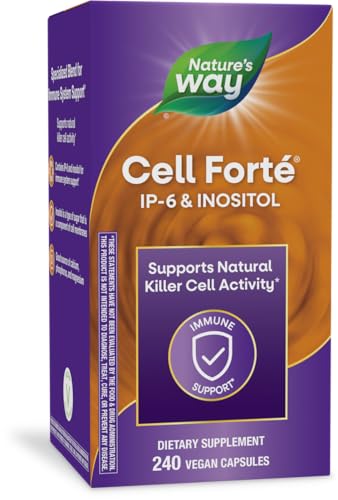
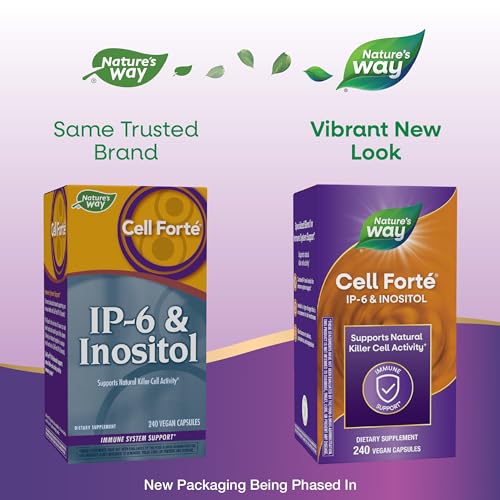
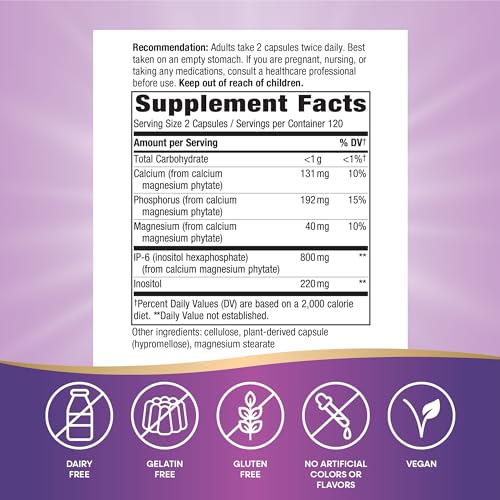
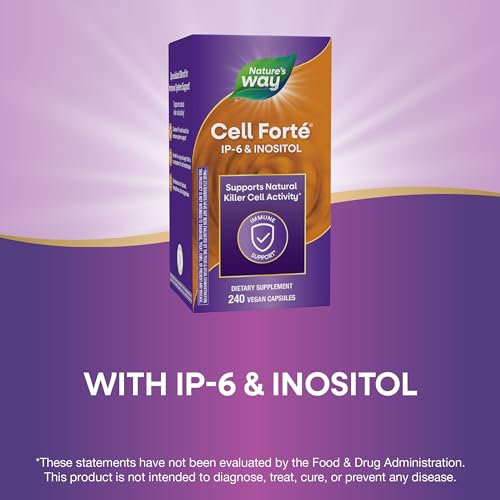

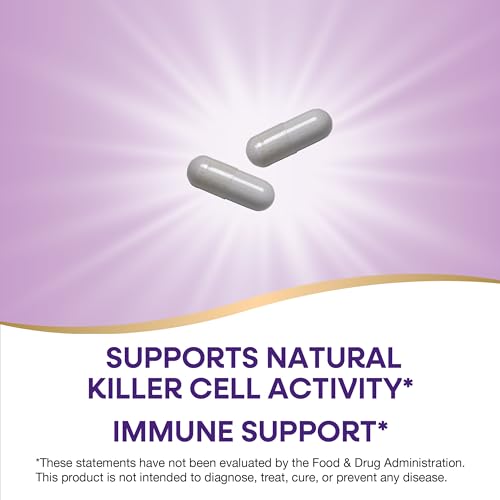

Nature's Way Immune Defense Supplement - Supports Natural Killer Cell Activity, Vegan - 240 Capsules


Red Phosphorus
High RiskRed phosphorus is a non-toxic, amorphous form of the element phosphorus. It is primarily used in safety matches, fireworks, and some pyrotechnic devices. Red phosphorus serves as a flame retardant and is also utilized in the production of certain chemicals.
Sustai Insights
Red phosphorus offers functional benefits as a flame retardant and is non-toxic compared to other phosphorus forms. However, it is associated with high use restrictions due to regulatory concerns. Health risks are minimal, with low potential for carcinogenicity and allergenic reactions; yet, it may pose environmental risks as a pollutant. Regulatory bodies have flagged it with advisories, indicating a high-risk level overall. Safe usage practices should be adhered to, and alternatives like safer flame retardants exist.
Calcium
Medium RiskCalcium is a chemical element commonly found in various compounds and is essential for biological functions, particularly in bone health and cellular processes. It is utilized in products for its role in maintaining structural integrity and as a dietary supplement.
Sustai Insights
Calcium offers functional benefits such as supporting bone health and acting as a buffering agent in formulations. While generally safe, it presents moderate allergenic potential and concerns regarding persistence and bioaccumulation in the environment. Regulatory bodies have minimal restrictions, indicating a low risk for carcinogenicity and developmental toxicity. Safe usage practices should be adhered to, especially for sensitive populations. Alternatives like plant-based calcium sources may be considered for those seeking sustainable options. Overall, the risk level associated with calcium is assessed as medium.
Cellulose
Low RiskCellulose is a natural polysaccharide derived from plant cell walls, primarily used as a thickening agent, stabilizer, and emulsifier in cosmetic formulations. It is known for its ability to improve texture and consistency in products.
Sustai Insights
Cellulose serves as an effective thickening and stabilizing agent, enhancing product texture while being biodegradable and derived from renewable sources. Health risks are minimal, with low concerns regarding carcinogenicity, allergies, and reproductive toxicity. Environmental impacts are also low, as cellulose does not contribute significantly to pollution or bioaccumulation. Regulatory agencies have not issued restrictions on its use. Overall, cellulose presents a low risk profile, making it a suitable ingredient choice in cosmetics.
Hydroxymethylcellulose
Low RiskHydroxymethylcellulose is a synthetic polymer derived from cellulose, primarily used as a thickening agent, emulsifier, and film-forming agent in various personal care and cosmetic products. It enhances texture, stability, and moisture retention, making it suitable for use in creams, lotions, and gels.
Sustai Insights
Hydroxymethylcellulose serves effectively as a thickener and stabilizer, contributing to product texture and moisture retention. It is considered low risk for health concerns such as carcinogenicity, allergies, and reproductive toxicity. Environmentally, it is not classified as a pollutant or bioaccumulative, aligning with regulatory standards in multiple regions. Overall, its risk level is assessed as low, with no significant adverse effects reported. Safe usage practices should be followed, and while alternatives exist, hydroxymethylcellulose remains a suitable choice in formulations.
Magnesium
Low RiskMagnesium is a mineral commonly found in various products, serving primarily as a nutrient that supports multiple biological functions, including muscle and nerve function, and energy production. It is often included in dietary supplements and fortified foods to address magnesium deficiency.
Sustai Insights
Magnesium offers functional benefits such as aiding in muscle relaxation and energy production, making it an important nutrient. It is sustainably sourced and generally considered low risk, with minimal health concerns related to cancer, allergies, or reproductive toxicity. Environmental risks are also low, as it does not contribute significantly to pollution or bioaccumulation. Regulatory status is favorable, with no current restrictions. Safe usage practices involve adhering to recommended dietary allowances. Overall, magnesium is a low-risk ingredient with no significant adverse effects, making it a suitable choice in various applications.
Inositol
Low RiskInositol is a cyclic polyol, a type of sugar alcohol. It plays a crucial role in cellular signaling and is often included in dietary supplements and cosmetic formulations for its potential benefits related to skin health and metabolic function.
Sustai Insights
Inositol is recognized for its functional benefits, including promoting cellular health and potentially aiding in metabolic processes. It is not associated with significant health risks such as carcinogenicity or allergenic reactions, and regulatory bodies have not placed restrictions on its use. No notable environmental hazards or pollutant concerns have been identified, leading to an overall low-risk assessment. Safe usage practices are generally recommended, and while alternatives exist, inositol remains a viable option with low adverse effects.
Phytic Acid
Low RiskPhytic acid is a hexaphosphoric acid ester of inositol, primarily found in seeds, grains, and legumes. It acts as an antioxidant and is often used in cosmetic formulations for its chelating properties, helping to stabilize products by binding metal ions.
Sustai Insights
Phytic acid provides functional benefits such as antioxidant properties and metal ion chelation, enhancing product stability. It is considered environmentally friendly due to its biodegradable nature. Health risks are low, with minimal concerns regarding carcinogenicity, allergies, or reproductive toxicity. Regulatory bodies have imposed minor restrictions, and overall, the risk level is assessed as low. For safe usage, it is important to follow recommended concentrations. Alternatives like ascorbic acid could be considered for similar antioxidant effects.
Magnesium Stearate
Low RiskMagnesium stearate is a magnesium salt of stearic acid, commonly used as a lubricant and anti-caking agent in pharmaceuticals and cosmetic products. It helps in the manufacturing process by preventing ingredients from clumping together and ensuring even distribution in formulations.
Sustai Insights
Magnesium stearate is recognized for its functional benefits as a lubricant and anti-caking agent, enhancing product stability. It is considered low risk regarding health concerns, including carcinogenicity and allergenic potential, with no significant environmental hazards reported. Regulatory bodies, including the FDA, have not imposed major restrictions, supporting its safe use in various applications. Recommended usage levels are typically low, maintaining safety in formulations. Overall, the ingredient is assessed as low risk, with no significant adverse health or environmental impacts identified.
Cellulose
Low RiskCellulose is a natural polysaccharide derived from plant cell walls, primarily used as a thickening agent, stabilizer, and emulsifier in cosmetic formulations. It is known for its ability to improve texture and consistency in products.
Sustai Insights
Cellulose serves as an effective thickening and stabilizing agent, enhancing product texture while being biodegradable and derived from renewable sources. Health risks are minimal, with low concerns regarding carcinogenicity, allergies, and reproductive toxicity. Environmental impacts are also low, as cellulose does not contribute significantly to pollution or bioaccumulation. Regulatory agencies have not issued restrictions on its use. Overall, cellulose presents a low risk profile, making it a suitable ingredient choice in cosmetics.
Hydroxymethylcellulose
Low RiskHydroxymethylcellulose is a synthetic polymer derived from cellulose, primarily used as a thickening agent, emulsifier, and film-forming agent in various personal care and cosmetic products. It enhances texture, stability, and moisture retention, making it suitable for use in creams, lotions, and gels.
Sustai Insights
Hydroxymethylcellulose serves effectively as a thickener and stabilizer, contributing to product texture and moisture retention. It is considered low risk for health concerns such as carcinogenicity, allergies, and reproductive toxicity. Environmentally, it is not classified as a pollutant or bioaccumulative, aligning with regulatory standards in multiple regions. Overall, its risk level is assessed as low, with no significant adverse effects reported. Safe usage practices should be followed, and while alternatives exist, hydroxymethylcellulose remains a suitable choice in formulations.
Magnesium
Low RiskMagnesium is a mineral commonly found in various products, serving primarily as a nutrient that supports multiple biological functions, including muscle and nerve function, and energy production. It is often included in dietary supplements and fortified foods to address magnesium deficiency.
Sustai Insights
Magnesium offers functional benefits such as aiding in muscle relaxation and energy production, making it an important nutrient. It is sustainably sourced and generally considered low risk, with minimal health concerns related to cancer, allergies, or reproductive toxicity. Environmental risks are also low, as it does not contribute significantly to pollution or bioaccumulation. Regulatory status is favorable, with no current restrictions. Safe usage practices involve adhering to recommended dietary allowances. Overall, magnesium is a low-risk ingredient with no significant adverse effects, making it a suitable choice in various applications.
Inositol
Low RiskInositol is a cyclic polyol, a type of sugar alcohol. It plays a crucial role in cellular signaling and is often included in dietary supplements and cosmetic formulations for its potential benefits related to skin health and metabolic function.
Sustai Insights
Inositol is recognized for its functional benefits, including promoting cellular health and potentially aiding in metabolic processes. It is not associated with significant health risks such as carcinogenicity or allergenic reactions, and regulatory bodies have not placed restrictions on its use. No notable environmental hazards or pollutant concerns have been identified, leading to an overall low-risk assessment. Safe usage practices are generally recommended, and while alternatives exist, inositol remains a viable option with low adverse effects.
Phytic Acid
Low RiskPhytic acid is a hexaphosphoric acid ester of inositol, primarily found in seeds, grains, and legumes. It acts as an antioxidant and is often used in cosmetic formulations for its chelating properties, helping to stabilize products by binding metal ions.
Sustai Insights
Phytic acid provides functional benefits such as antioxidant properties and metal ion chelation, enhancing product stability. It is considered environmentally friendly due to its biodegradable nature. Health risks are low, with minimal concerns regarding carcinogenicity, allergies, or reproductive toxicity. Regulatory bodies have imposed minor restrictions, and overall, the risk level is assessed as low. For safe usage, it is important to follow recommended concentrations. Alternatives like ascorbic acid could be considered for similar antioxidant effects.
Calcium
Medium RiskCalcium is a chemical element commonly found in various compounds and is essential for biological functions, particularly in bone health and cellular processes. It is utilized in products for its role in maintaining structural integrity and as a dietary supplement.
Sustai Insights
Calcium offers functional benefits such as supporting bone health and acting as a buffering agent in formulations. While generally safe, it presents moderate allergenic potential and concerns regarding persistence and bioaccumulation in the environment. Regulatory bodies have minimal restrictions, indicating a low risk for carcinogenicity and developmental toxicity. Safe usage practices should be adhered to, especially for sensitive populations. Alternatives like plant-based calcium sources may be considered for those seeking sustainable options. Overall, the risk level associated with calcium is assessed as medium.
Red Phosphorus
High RiskRed phosphorus is a non-toxic, amorphous form of the element phosphorus. It is primarily used in safety matches, fireworks, and some pyrotechnic devices. Red phosphorus serves as a flame retardant and is also utilized in the production of certain chemicals.
Sustai Insights
Red phosphorus offers functional benefits as a flame retardant and is non-toxic compared to other phosphorus forms. However, it is associated with high use restrictions due to regulatory concerns. Health risks are minimal, with low potential for carcinogenicity and allergenic reactions; yet, it may pose environmental risks as a pollutant. Regulatory bodies have flagged it with advisories, indicating a high-risk level overall. Safe usage practices should be adhered to, and alternatives like safer flame retardants exist.
Magnesium Stearate
Low RiskMagnesium stearate is a magnesium salt of stearic acid, commonly used as a lubricant and anti-caking agent in pharmaceuticals and cosmetic products. It helps in the manufacturing process by preventing ingredients from clumping together and ensuring even distribution in formulations.
Sustai Insights
Magnesium stearate is recognized for its functional benefits as a lubricant and anti-caking agent, enhancing product stability. It is considered low risk regarding health concerns, including carcinogenicity and allergenic potential, with no significant environmental hazards reported. Regulatory bodies, including the FDA, have not imposed major restrictions, supporting its safe use in various applications. Recommended usage levels are typically low, maintaining safety in formulations. Overall, the ingredient is assessed as low risk, with no significant adverse health or environmental impacts identified.
Discover Nature's Way Cell Forté IP-6 & Inositol, a powerful immune defense supplement designed to enhance natural killer cell activity and support overall immune health. This gluten-free and vegan formula ensures you nourish your body with essential vitamins and minerals without compromising on quality or ethics.
- Immune Support: Contains IP-6 and Inositol, which are known to bolster the body’s natural defenses against illness.*
- Nutrient-Rich: Each serving provides a good source of calcium, phosphorus, and magnesium to support bone health and metabolic functions.*
- Clean Ingredients: Free from gluten, soy, dairy, gelatin, and artificial additives, making it suitable for various dietary preferences.*
- Easy to Use: Recommended usage of 2 capsules twice daily on an empty stomach for optimal absorption, promoting consistency in your wellness routine.*
- Trusted Brand: Nature’s Way has over 50 years of experience in providing high-quality supplements derived from natural sources, ensuring you and your family get the best support.*
Empower your health journey with Nature's Way Cell Forté today!
Subscribe & Save with Sustai
- Best Price Guarantee: Always enjoy the lowest prices on sustainable home essentials.
- No Surprises: We’ll notify you before shipping. No hidden fees, ever.
- You’re in Charge: Change, pause, or cancel your subscription anytime with ease.
- Eco-Friendly Deliveries: Our grouped shipments mean less packaging and lower emissions.
Join us on a sustainable journey. Special offers for a limited time! Prices and promotions may change.
Recommended Products
Discover Nature's Way Cell Forté IP-6 & Inositol, a powerful immune defense supplement designed to enhance natural killer cell activity and support overall immune health. This gluten-free and vegan formula ensures you nourish your body with essential vitamins and minerals without compromising on quality or ethics.
- Immune Support: Contains IP-6 and Inositol, which are known to bolster the body’s natural defenses against illness.*
- Nutrient-Rich: Each serving provides a good source of calcium, phosphorus, and magnesium to support bone health and metabolic functions.*
- Clean Ingredients: Free from gluten, soy, dairy, gelatin, and artificial additives, making it suitable for various dietary preferences.*
- Easy to Use: Recommended usage of 2 capsules twice daily on an empty stomach for optimal absorption, promoting consistency in your wellness routine.*
- Trusted Brand: Nature’s Way has over 50 years of experience in providing high-quality supplements derived from natural sources, ensuring you and your family get the best support.*
Empower your health journey with Nature's Way Cell Forté today!

You can have at most 2 Sustainable Steals products in your cart
Customer Reviews
Customers’ View
Customers appreciate the effectiveness and value of this immune defense supplement, noting its role in enhancing immune system function. Many users report significant health benefits, such as improved energy levels and pain relief, with some stating it has helped alleviate conditions like neuropathy and fatigue. The product is also recognized for its economical packaging, providing 240 capsules that facilitate easy daily use. Environmentally conscious consumers will value its clean ingredient profile, being vegan-friendly and free from gluten, wheat, soy, and dairy. Overall, customers find this supplement to be a reliable option for supporting their health and well-being.
AI-generated from the text of customer reviewsThis product has no reviews yet.




